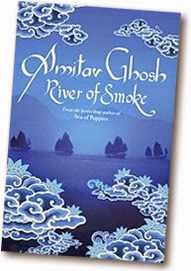River of Smoke by Amitav Ghosh
 |
| Image from http://www.amitavghosh.com/riverofsmoke.html |
I picked this up in the National Library - the nice blue cover and I had heard the name of the author before. The book is heavy - 520 pages.
This is the second of a trilogy based on a ship which had problems in the Indian Ocean. It starts sometime when one of the survivors , now in Mauritius, looks back on the story. The story then moves back in time to Canton and the years before the First Opium War . There are different characters - white merchants, Parsi merchants, Chinese merchants and people of different nationalities. There is some moral discussion about the opium trade. Ghosh introduces Mauritian dialect (French/Hindustani) and pidgin English and other languages.
It was easy to get confused by the timeline and the different characters. Some of them were connected. There is Deeti at the beginning and the end of the book. And Neel. There is focus on Bahram , the Parsi merchant who has to decide between right and wrong in the trade of opium. There is Paulette, a French orphan who works on a ship which trades in plants . And Robin, an art person who moves to Canton , to the male only place, to find a Friend and finds one in Jaqua according to the many letters he writes to Paulette in a very annoying style (Ghosh makes a lot of references to men loving (and possibly more) men including one man cursing another with being 'Bulgarian' and teaching Bulgar methods to another )
There is lavish description of clothes and food. Including an 88 course meal which included a dish with fish gizzards and caterpillars sweetened on sugar cane. As a result, one woman, Asha - didi had a very popular kitchen boat in which she offered masala curries with food which people would know to all the people from India who passed through Canton.
The book is historical. If the history is true, it gives a fascinating view about a different part of the world far from Guyana yet connected because of the issue of migration from India and China during the time of the novel.
The book drags on in parts, but there is some suspense in the last fifty pages or so.
The book is recommended for those who want to read history without reading history.
Amitav Ghosh talks about the book in the first 10 minutes of this Open Book podcast from the BBC.



Comments
Post a Comment